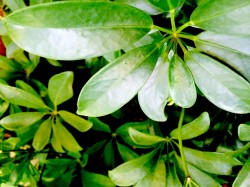If I had a dime for every wise guy who responded to my vegetarian diet in the last nineteen years with, “What about the plants? All of those poor plants you eat?” my college loans would be paid off. Yet, what about those plants?
Talking to tomato plants is a cliché for baby boomers who never let go of tie-dye, who still may or may not believe in the discredited studies of Cleve Backster, Peter Tompkins, and Christphor Bird. Backster hooked up his houseplants to a polygraph machine to read emotional responses in 1967, and six years later, Tomkins and Bird wrote the book The Secret Life of Plants. The book claims that plants are sentients, yet is somewhat discredited due to its supernatural speculations. Backster was discredited soon after, when his findings were not able to be duplicated. The scientific world, for the most part, turned their backs on plant feelings and intelligence.

It seems impossible to conceive plants as beings of intellect and soul, since they do not have a brain. They simply react to sun, water, and fertilizer. They appear to be a collection of cells that have stood the test of evolution, many staking their survival on human adoration and consumption. They clean our air, give us shelter, and provide every medicine for our ailments.
In contrast to this functional view of plants, there now is a quiet buzz within the scientific community, again raising the possibility that plants are so much more than we realize. Credible scientific institutions are publishing studies that indicate plant emotions and intelligence. What was once wrapped inside of macramé hemp is again inside of scientific journals.
One group of scientists in France have discovered that trees make sounds, at a frequency undetected by the human ear when they are thirsty; they even make different sounds when they are severely dehydrated. Do trees cry when they need water? Do trees experience suffering? Do they fear death? Are they communicating? Are they praying? These questions may at first seem childish or romantic, but some are finding validity and reality to these hippy-dippy, crunchy inquisitions.
2005 marked the first meeting in Florence for the Society for Plant Neurobiology. Though our green comrades lack a brain, they do in fact have neurotransmitters that include dopamine, serotonin, and glutamate. It remains a mystery as to why and how these neurotransmitters exist without neurons, and whether plants act as individuals, or simply as a reactive cluster of cells. One of the more appealing arguments for scientists proving plants act on an individual basis is each plant’s adaptation to circadian rhythms, and as in sunflowers, solar tracking. It is also impressive that plants appear to have memory and “learn,” adapting as animals do. In a PRI radio interview, Michael Pollan discusses an experiment that shows how plants react to pain, and eventually adapt–they can respond to 15-20 environmental variables. They also can be “put out” with human anthesetics, and can make their own.
In Pollan’s book, Botany of Desire, he explains the survival of flowers such as tulips, and how they make themselves alluring to the human eye for the survival of their species. That’s pretty smart, considering they don’t even have nervous systems.
We are beginning to see plants–maybe even life–in a new light. What if intelligence or a consciousness exists without a brain, hearts, and nerves? What about all of the ethereal potential prana, chi, or life energy inside those cells? Take a walk outside, perhaps even through the woods with the idea that you are amongst intelligent life. This new scientific front is both fascinating and illuminating, and certainly sheds new light on my “conscious” plant diet.
Related: Do Animals Really Feel Emotions?
The Joy of Joining a Community Garden
Also by Jessica Riley-Norton: Raw Vegan Coconut Cream Pie
__
Photo: Jessica Riley-Norton





